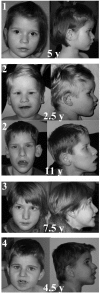Mutations in TCF4, encoding a class I basic helix-loop-helix transcription factor, are responsible for Pitt-Hopkins syndrome, a severe epileptic encephalopathy associated with autonomic dysfunction
- PMID: 17436254
- PMCID: PMC1852736
- DOI: 10.1086/515582
Mutations in TCF4, encoding a class I basic helix-loop-helix transcription factor, are responsible for Pitt-Hopkins syndrome, a severe epileptic encephalopathy associated with autonomic dysfunction
Abstract
Pitt-Hopkins syndrome (PHS) is a rare syndromic encephalopathy characterized by daily bouts of hyperventilation and a facial gestalt. We report a 1.8-Mb de novo microdeletion on chromosome 18q21.1, identified by array-comparative genomic hybridization in one patient with PHS. We subsequently identified two de novo heterozygous missense mutations of a conserved amino acid in the basic region of the TCF4 gene in three additional subjects with PHS. These findings demonstrate that TCF4 anomalies are responsible for PHS and provide the first evidence of a human disorder related to class I basic helix-loop-helix transcription-factor defects (also known as "E proteins"). Moreover, our data may shed new light on the normal processes underlying autonomic nervous system development and maintenance of an appropriate ventilatory neuronal circuitry.
Figures



References
Web Resources
-
- Ensembl Genome Browser, http://www.ensembl.org/
-
- GenBank, http://www.ncbi.nlm.nih.gov/Genbank/ (for TCF4 [accession number NM_003199])
-
- National Center for Biotechnology Information, http://www.ncbi.nlm.nih.gov/
-
- Online Mendelian Inheritance in Man (OMIM), http://www.ncbi.nlm.nih.gov/Omim/ (for TCF4, MBD2, ASCL1, HOX11L2, Mowat-Wilson syndrome, Goldberg-Shprintzen syndrome, Rett syndrome, and Angelman syndrome)
Publication types
MeSH terms
Substances
Associated data
- Actions
- Actions
Grants and funding
LinkOut - more resources
Full Text Sources
Other Literature Sources
Medical
Molecular Biology Databases
Miscellaneous

